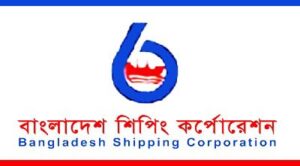
by F R Chowdhury 21 February 2021
Bangladesh Shipping Corporation (BSC) celebrated its Golden Anniversary (50 years) on 5 February 2022. Some former employees of BSC felt very nostalgic about it and I read quite a few interesting comments on LINKEDIN and other websites. Despite the difficulties faced at the time of its establishment, it achieved commendable success initially, but this did not continue. One person raised this important point and was very critical of corruption and mismanagement within BSC and many agreed with him. This article therefore wishes to examine the concerns raised. A detailed analysis needs to be undertaken and an investigation needs to be commenced to apportion accountability and report the findings with recommendations and remedial actions.
BSC started with only one asset – a few dedicated and determined mariners. The Government gave them all the support and the Corporation flourished like no other business. That was roughly the story of the first 20 years i.e. 1972 to 1992. The decline started soon after.
For an organization like BSC, it is best to have one (single) chief executive instead of dividing power and responsibility. Let the Chairman & Managing Director be responsible to the board as well as to the government (relevant minister). When the minister becomes the chairman the chain of command and accountability gets lost. The government (minister) is supposed to question the failure of reaching the target. But if he is the chairman then who is he going to ask for. Will the chairman (the minister) attend the shareholders’ meeting and answer all the questions? I feel the government should withdraw from direct or partial management and find a competent and capable person and make him accountable and answerable. The minister should quit the role of chairman and remain as the government watch-dog to monitor its progress and question any suspicious activities.
What makes a capable and competent person for a job like this? Knowledge of commercial shipping is helpful but is not the only criterion. It does not exclude senior naval officers but certainly does not make them the only suitable candidates. It could even be a career civil servant provided one has the experience of international trade and commerce. It could even be a chartered accountant or a lawyer with the knowledge of the business. As a matter of fact it has to be a person with the combination of knowledge and skill. In India, there is a permanent search committee to select persons for similar autonomous bodies and state owned enterprises. It is time we come out of the blind notion to think that any particular service makes a person more suitable for such a job.
The second point that comes into focus is governmental and bureaucratic interference. Government has a right to question any irregularity or suspicious deal but the work of the organization must not be delayed or hampered by unnecessary approvals or no objections. There is no need for the government to advise in advance – what to do or how to do. That is for the corporation to draw the business strategy and work accordingly. I shall give one example – how much independence and authority such a state owned company exercises. Mr. Lee Kuan Yew, the then prime minister of Singapore saw it in the TV news that his “Neptune-Orient” (state owned national shipping company of Singapore) purchased APL (American President Line) along with the ownership of railway connection between the two coasts for movement of the containers. It is more interesting to know that the chief executive of Neptune-Orient was not even a Singapore national. He was a Pakistani named Captain Saeed (former deputy conservator of Chittagong port and later commercial director of PNSC). Capt. Saeed returned back to Pakistan for his retired life after receiving the highest civil award of that country.
Coming back to BSC, it suffered the worst period of neglect, nepotism and corruption between the periods 1993 to 2018. Many of those connected with BSC were engaged in extracting the last drop of juice from it, in a manner as if there is no tomorrow. Despite having a huge commercial department to procure business, the management was more interested in chartering out the vessels. The reasons are well understood to all those who have the minimum knowledge of shipping operations. Those in the governance and management of BSC made a quick fortune in collaboration with some of the Myanmar and Singapore based traders. Direct service to Europe and USA went to history pages. BSC did not even operate the important container feeder services. We then had the mysterious stories of new buildings and procurement. Even if it is against loan or grant, the recipient has the right to advertise and procure the best from that country. But the deal was by no means transparent. BSC had to accept the ships as well as the loan liability whereas those making the deals were never questioned. What I wrote here briefly shows the extent of corruption and mismanagement. In a democratic country it is not acceptable. It has to be investigated and those responsible must be tried under the law. Such bold action will help remove corruption once for all.
I have to remind the readers about some more cases of corruption and misuse of government funds. It happened about the same time. There was talk of a deep sea port. Suddenly we heard of Pyra becoming a seaport. A few Mariners, including me, wrote about this matter and gave warning that the maintenance dredging will cost more that the port may eventually earn. However, the minister for shipping (at that time) and the then chairman of Chittagong port authority (later becoming naval chief) were extremely keen to go ahead with the project. Everything was done with much haste, without a proper project and investment plan so that those associated with the project could personally benefit. I do not know as to how many millions, or billions have already been spent but all that we now know is that operation of Pyra as a commercial seaport is not viable. I do not know if the project is now abandoned or not. Again in a democratic society corrupt people should not get away so easily. All suspicious cases must be investigated and those responsible must face justice.
There are further stories of mismanagement. This one is unique and I do not know of any such deliberate violation of “rules of business” and acting beyond remit. When Pangao’s internal container terminal was ready for inauguration, the chairman of the port authority expressed his desire to operate a container feeder service from Chittagong to Pangao with containers. The minister immediately authorized the port authority for procurement of vessels with no regard to the fact that state owned enterprise BSC operates vessels for international trade and BIWTC operates for the inland sector. Such duplication and clash in “rules of business” (primary purpose) is certainly not good for the country and the relevant authority or organization. It seems we have not learnt the lesson because we can still see similar duplication as we have a maritime affairs division in the foreign ministry though it is already looked after by the department of shipping under the ministry of shipping. The remit of CPA was to operate a sea port with safety and efficiency. It should have never been allowed to operate shipping service. Today those vessels are lying idle as a liability to CPA. It appears that the primary objective was to engage in procurement business involving some millions of taka. All the irregularity points the fingers to the same direction, I mean the same persons. Similarly, we have the misappropriation of funds related to dredging operations.
Bangladesh has produced some excellent expertise in the maritime sector. Unfortunately there is no job for them in Bangladesh. The Bangladeshi experts are now working abroad with excellent results. We do not have any of them in any key positions in Bangladesh. We also do not have a culture of public consultancy or accountability. International Professional bodies, such as The Nautical Institute (NI), The Institute of Marine Engineering, Science and Technology (IMarEST) etc. have active membership and branches in Bangladesh. These groups are professional organizations with no commercial interest and could contribute with their important professional views, if consulted.
There is substance in the call from the Mariners that in addition to celebrating BSC’s 50th anniversary, it is also time to reflect on what transpired in these fifty years. Much needs to be investigated and it is disappointing that an organization with such an important national role to play now languishes, solely due to the mismanagement and corruption which went ahead for years, unchecked, and at times, supported by those who were entrusted with its responsibility in the first place.
Finally, this is an appeal that corruption, in every form, must be investigated and uprooted. There must be no time bars or limits to commence an investigation. Our national anti-corruption body, DUDOK, may be given this important task. Every penny of the tax payers’ money must be reconciled. The nation needs to know the facts and those responsible should be brought to task. It is also an appeal to the Prime Minister to give necessary instructions (defining remits, powers and functions of each unit) to inculcate discipline, accountability and integrity within senior management as well as the national administration.
London, 15-February-2022 <fazlu.chowdhury@btinternet.com>










You really wrote a great article. While I was scratching the tip of the iceberg, you incised into the heart of it. I used to be proud of BSC at one time, later to lothe it. I do not have knowledge of the inner workings of this corporation; therefore, could not point those out. You have rescued me and placed them succinctly. I learned more about the corruption and the cause of it.
I bet, most mariners are not aware of the cause of the dysfunctionality of BSC. Your article sheds out a trove of information. We should all read it line for line and question the authorities as to why they play with our careers and properties owned the people of Bangladesh. If we don’t who will?
Suhrawardi